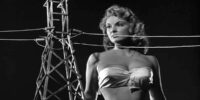A variety of themes are explored in Chuck Wendig’s Bram Stoker Award-nominated The Book of Accidents. It tackles multi-world theories, magic, and generational trauma in one 540-page book through the lens of wonderfully complex characters. The mention of climate change was one of the novel’s underlying themes.
Eco-horror has become a genre in its own right, but for The Book of Accidents, it isn’t a core theme delved into throughout the novel, but it is mentioned, either in dialogue, descriptions of the turning weather, or in the character’s exposition. Rather than embracing the theme at the core of the novel, Wendig perfectly represents the undertone of worry in modern society in how we tackle the climate, in the backdrop of a family dealing with their own horrors.
Denial

One of the unfortunately common perspectives toward climate change is denial. Whether it is the perspectives of government, unfounded claims of scaremongering, or complete disregard for anything that will affect people beyond that individual’s lifetime, denial runs rampant throughout the world. Often, it isn’t out of malice but with wanting to talk about something ‘nicer.’
In a conversation at a Halloween party, the adults in The Book of Accidents talk about the storm ravaging the town:
“Jed, meanwhile, wore a cheeky face, as if this surge in bad weather was all part of the plan. Special effects maybe. Pleased as peaches, he said, ‘I dare say we’ve angered the spirits of Ramble Rocks.’
“I say we’ve angered the earth,” Zoe said. “It’s climate change.”
“Zo,” Fig said. “Not again.”
“Oh, gods,” Trudy said, “let’s talk about something a little less of a bummer please.”’
The conversation is fairly bland, but it tells so much more. It is a common interaction with people around us, where some want to open a dialogue while others simply want to shut it down. The use of ‘bummer’ cheapens climate change to a depressing topic, rather than an ongoing event. And the “Not again” of Fig suggests they’ve been in this boat of denial before. In that, denial continues within groups of adults, and over time, climate change only escalates while they remain trapped in this loop of denial.
How they shut down Zoe forces the readers to empathise with her because she is shut down and labeled a ‘bummer’ for being concerned about the world around them. By empathising with Zoe, Wendig encourages the readers to be the one who brings up climate change even when no one wants to talk about it. It would be easy to convey each person in the novel as caring about climate change as a way to influence readers, but instead, Wendig portrays human reality. It is an exact reflection of denial, whether or not the reader has been the Zoe or the Trudy in the situation. But what is also interesting is that these conversations are not isolated events and do end up having an impact on the other characters, as seen in a later shift in Fig when he reveals his wife is pregnant.
Questioning

In a later conversation with Nate, Fig posits the question of whether or not it is right to be having a child when the world isn’t going great. The conversation is shortly after his with Zoe, and thus presents an effective impact on another character, an aspect of writing Wendig does masterfully. Contending with his debate of excitement about having a baby, Fig laments:
‘“You ever think with the way the world is, it’s irresponsible to bring a kid into it? It’s like, this f*cking president and climate change and god, what else? Antibiotics are failing and they say all the bugs are dying and the coral reefs, too. Countries are building up their nuclear arsenals instead of pairing them down. I just…sh*t, a new kid might be a burden on this world, and this world will sure as hell end up a burden on our kid.”’
His reaction presents the negative impact the crumbling world has on the minutia of life. Simply having a child, what was once a joyous and for many, inevitable event, now becomes something to question the result of in the long term of the entirety of that child’s life. To many, the future is no longer a happy place to gift a child to, it is as Fig posits a burden on our kid. But it is not only climate change, but the impending spiral Fig discusses, this idea that nothing in the current state of the world is going to make a child’s future tolerable. Contrasted to Nate’s initial reaction to finding out Fig is having a baby:
‘“That’s amazing, Fig. I had no idea. Congratulations to the both of you.”’
Nate’s reaction to the pregnancy being immediately ‘amazing’ effectively contrasts Fig’s indecision. The conversation between the two thus demonstrates the shift between Nate having a child over a decade ago and Fig having one in the present. A once congratulatory event now drowns in complex indecision of the current state of the world.
Acceptance

Nate however demonstrates an attitude that is quite different from the others. Although he is aware of climate change, Zoe and Olly’s awareness render this inevitable, he also doesn’t ruminate on it as much as the others. He presents a different kind of reality, where there isn’t perpetual anxiety or complacency but an acceptance.
‘Nate was surprised. He didn’t remember fireflies being out this late in the season. Summer had just ended but it was still hot out. Maybe their season had changed—climate change had gone and borked everything up, hasn’t it? The seasons weren’t really the seasons anymore.’
Nate carefully depicts the change, which is visible, and possible anxiety-inducing to some people, as simply surprising. It is more complex than a happy surprise visit, though. It is this surprise of change. In the passage, he remembers a time that wasn’t still hot out, and a time wherein fireflies weren’t out that late. The memory expresses the unfortunate reality of a generation being able to physically see the climate change unfolding before them, however, his reaction, of leaning on the facts doesn’t present concern, but almost surrender. His question of “climate change had gone and borked everything up hasn’t it?” is rhetorical, he doesn’t offer himself solutions or consider how it all changes, he just states it as fact.
Similarly, in an earlier conversation with Olly, Nate doesn’t delve into the complexity of climate change. He doesn’t offer Olly hope or discussions about how they can improve the world together he just simply shrugs:
“It’s kinda hot out.”
“It is.”
“Climate change, I guess.”
Dad shrugged. “I guess.”
Although a fairly bland conversation without much to gain from it, the dynamic between him and Olly demonstrates the dissonance between the two of them. For context, Olly and Nate get along well, if not better than most father-and-son relationships. So the conversation is not Nate being a bad father ignoring his son, but it is a demonstration of the emotive reaction towards climate change. Being the instigator of the conversation, Olly demonstrates worry, and possibly brought up the conversation with his dad for some kind of hint of hope, whereas Nate, who is much older, and not concerned about the doom of his future, has the privilege of being able to shrug it off. Olly has a much different emotive reaction towards climate change which is shown in his reaction to a weather change versus Nates.
Anxiety

Where Nate met the observation of climate change with shrugs, rhetorical questions and acceptance, Olly regards it with spiraling anxiety.
“It wasn’t a normal storm. The specter of climate change rose in his head: a great hot shadow that would burn up the earth and boil the seas. But there, the fear in him was not about its effects on him, but the effects on everyone he loved. On people, he didn’t even know. On birds and fish and—for a moment, his mind spiralled and he thought of people screaming as wildfires burned their houses down, or someone as they drowned in rising floodwaters, on refugees forced from their homes and thrown into camps…”
Olly’s reaction is starkly different from Nate’s. Nate only regards what’s right in front of him, whereas Olly, whether by nature of his anxiety or the excess time of doom ahead of him spirals into regarding every aspect of the world that is destined to be affected. Nate only gets as far as fireflies being a signal of climate change, while Olly cannot stop himself from delving into “wildfires” and “floodwaters.” But it is again, a not uncommon idea that children are holding a lot of the burden of climate change. They are the ones that must experience a future that has “a great hot shadow” looming over it.
The scenario of the storm is not a complete departure from Nate also noticing nature. Olly’s reminder of climate change by way of the storm is traumatic. It festers his spiraling emotions in a way that portrays how there is no way to live normally when the extreme weather conditions are a constant reminder creeping in.
The idea of climate change and the environment is an underlying theme in The Book of Accidents but it is one of importance. Throughout, Wendig carefully demonstrates how a contemporary novel cannot ignore the impending impact on the future. Climate change cannot be ignored in the literature, even in a novel wherein the horrors of climate change are not at the core of the novel itself. The reality is no matter what genre or medium, modern literature cannot, and should not be ignorant of the current events of the world, especially within contemporary works. Maybe this is a signal that eco-horror is not just a genre in itself but an inevitable consideration in the minds of all modern characters.


